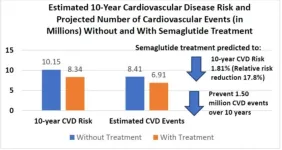“Anxiety and depression symptoms have long been associated with lower quality of life in people with cancer," said Heather Greenlee, ND, PhD, Co-Chair of the SIO Clinical Practice Guideline Committee. “Treating these symptoms using evidence-based integrative therapies will not only improve a patient’s quality of life, but it can help them better manage their care too. Now we know which therapies could have the biggest impact.”
The strongest recommendations in the guideline are for the use of mindfulness-based interventions, which include mindfulness-based stress reduction, meditation, and mindful movement. These interventions were recommended across the board to treat both anxiety and depression symptoms in patients in active treatment and those post-treatment due to the strong evidence to show their benefits to patients.
“For many people, cancer is the most difficult and frightening experience they have ever encountered,” said Past Chair of the ASCO Evidence-Based Medicine Committee, Scott T. Tagawa, MD, MS, FASCO, FACP. “Mindfulness-based interventions and other mind-body therapies not only provide tools to manage patients’ anxiety and depression symptoms, but they can also offer patients a sense of control over their illness, which we know can be helpful for patients who have to navigate a complex treatment journey.”
The SIO-ASCO guideline is a companion to the clinically based Management of Anxiety and Depression in Adult Survivors of Cancer: ASCO Guideline Update. It was created by an expert panel of integrative oncology, medical oncology, radiation oncology, surgical oncology, palliative oncology, behavioral medicine, mind-body medicine, nursing, methodology, and patient advocacy representatives. The panel reviewed existing published literature on integrative therapies used to treat anxiety and depression symptoms in cancer patients from randomized controlled trials. Once consensus was reached, recommendations were made based on the strength of the evidence available. The panel was co-chaired by Linda E. Carlson, PhD, President of SIO, and Julia Rowland, PhD, of Smith Center for Healing and the Arts representing ASCO.
“We have seen a steady increase in interest in these therapies among cancer patients over the years, but certain roadblocks have prevented patients from accessing them,” said Julia Rowland, PhD, Co-Chair of the SIO-ASCO guideline. “We hope that comprehensive cancer centers and governing administrative bodies consider prioritizing MBIs in patient care.”
Integrative oncology is a patient-centered, evidence-informed field of cancer care that utilizes mind and body practices, natural products, and/or lifestyle modifications from different traditions alongside conventional cancer treatments. Integrative oncology aims to optimize health, quality of life, and clinical outcomes across the cancer care continuum and to empower people to prevent cancer and become active participants before, during, and beyond cancer treatment.
“This is the second of a series of evidence-based guidelines addressing integrative therapies in cancer care that SIO and ASCO are developing together,” added Linda E. Carlson, PhD, President of SIO, Professor of Oncology at the University of Calgary, and Co-Chair of the guideline. “The goal of these guidelines is to inform as many clinicians and people living with cancer as possible about where the evidence lies to support the best clinical outcomes possible for all people with cancer. We believe this latest guideline accomplishes that for those suffering from anxiety and depression symptoms.”
Other interventions recommended in the guideline that had a lower level of evidence for their benefits included the use of relaxation, music therapy, and reflexology for treatment of both anxiety and depression symptoms during conventional treatment. Yoga was recommended for patients with breast cancer to treat both anxiety and depression symptoms, although the strength of the evidence was moderate. “We want to clarify that this does not mean yoga can only benefit women with breast cancer,” explained Dr. Carlson. “There is research that shows yoga can benefit people with various cancer types and we need to continue building the evidence base.”
To ensure people living with cancer can play a role in the treatment decision-making process and to inform their discussions about integrative therapies with their oncologists, ASCO and SIO have posted clinical tools, resources, and patient information related to this guideline on their respective websites.
Because the expert panel was conservative in making their recommendations, the guideline also includes areas identified as potentially relevant to cancer care but needing more research. This distinction is important because the lack of endorsement for a given therapy is not an indication that the therapy is necessarily ineffective or unsafe. “Rather, it indicates that the evidence was insufficient to support its recommendation,” said Dr. Rowland. “For instance, more studies are needed to assess the safety and effectiveness of natural health products.”
SIO received an unrestricted grant to fund guideline development from the Samueli Foundation.
###
About The Society for Integrative Oncology:
Founded in 2003, SIO is the premier multi-disciplinary international professional organization for integrative oncology. The mission of the SIO is to advance evidence-based, comprehensive, integrative healthcare to improve the lives of people affected by cancer. SIO enables communication, education, and research to occur by bringing together practitioners and researchers across professions focused on the care of cancer patients and survivors. Members share the common goals of excellent comprehensive patient care, enhancement of anti-cancer therapy, supportive care, and prevention of cancer. SIO members are part of a unique multidisciplinary community of oncologists, nurses, psychologists, social workers, nutritionists, complementary therapy practitioners, naturopathic doctors, acupuncturists, massage therapists, epidemiologists, researchers, and many other health care practitioners. Learn more at https://integrativeonc.org/, and follow us on Facebook, Twitter, LinkedIn, Instagram, and YouTube.
About the American Society of Clinical Oncology:
Founded in 1964, the American Society of Clinical Oncology, Inc. (ASCO®) is committed to the principle that knowledge conquers cancer. Together with the Association for Clinical Oncology, ASCO represents more than 45,000 oncology professionals who care for people living with cancer. Through research, education, and promotion of high quality, equitable patient care, ASCO works to conquer cancer and create a world where cancer is prevented or cured, and every survivor is healthy. Conquer Cancer, the ASCO Foundation, supports ASCO by funding groundbreaking research and education across cancer’s full continuum. Learn more at www.ASCO.org, explore patient education resources at www.Cancer.Net, and follow us on Facebook, Twitter, LinkedIn, Instagram, and YouTube.
END



